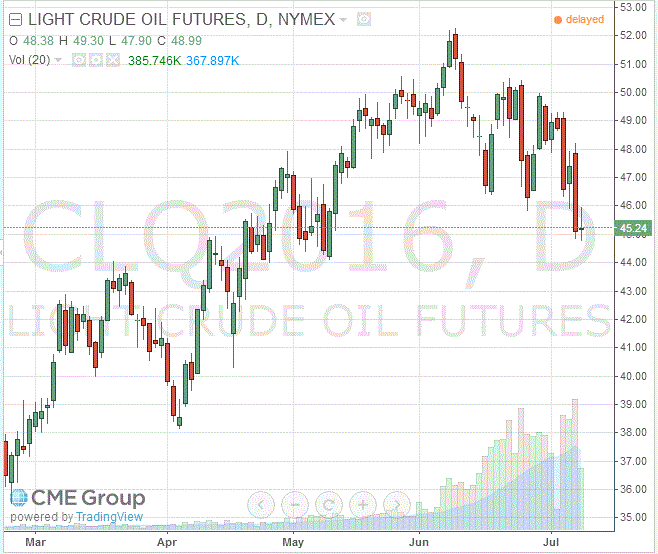- Oil futures fell slightly continuing yesterday's momentum
Noticias del mercado
Oil futures fell slightly continuing yesterday's momentum
Oil futures fell slightly, continuing yesterday's momentum, and paving the way for the biggest weekly drop since January. It is worth emphasizing, since the beginning of the week the price of Brent crude and WTI collapsed by almost 8%.
Initially, the oil price rose by about a percentage on the back of strong US employment data and concerns about the new militant attacks on oil facilities in Nigeria. However, the move could not be sustained because of renewed concerns regarding the increase in the volume of world oil supplies. Traders in the oil market are also watching the dollar and the stock indices to see if investors are willing to opt for a more volatile instruments such as commodities,
In focus were also statements by the International Monetary Fund. The IMF estimated that if OPEC has received only a small market share, the price of oil in 2020 could rise to $ 58-75 per barrel. "OPEC holds 42% of the market, compared to 35% if it is to adapt to new market realities. Lesser of two evils for OPEC in the future would be the desire to achieve market equilibrium ", - stated in the working documents of the Fund.
Also today, Societe Generale analysts noted that the decline in oil prices to $ 46 per barrel - a short-term phenomenon, and in the near future we should expect a recover up to $ 50 per barrel. "Despite the decline in US oil inventories another 2.2 million barrels and reduced production the price of Brent has fallen off by 5%. Possibly, the negative reaction of the market is related to the data published a day earlier by API that pointed to the decline in stocks by 6 million barrels "-. mentioned in Societe Generale.
The total number of drilling rigs in the United States on July 1 working week increased by 10 units, or 2.4%, to 431 unit. In annual terms, a decline of 431 units or 50%.
The cost of the August futures for US light crude oil WTI fell to 45.24 dollars per barrel.
The price of August futures for Brent fell to 46.40 dollars a barrel on the London Stock Exchange ICE Futures Europe.
